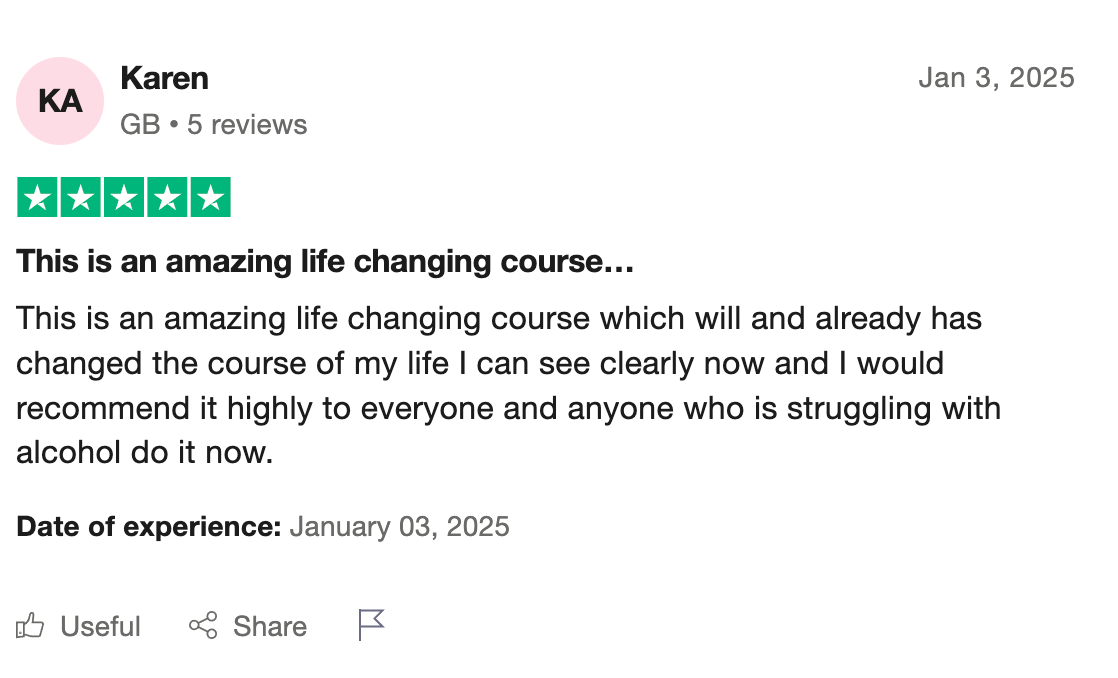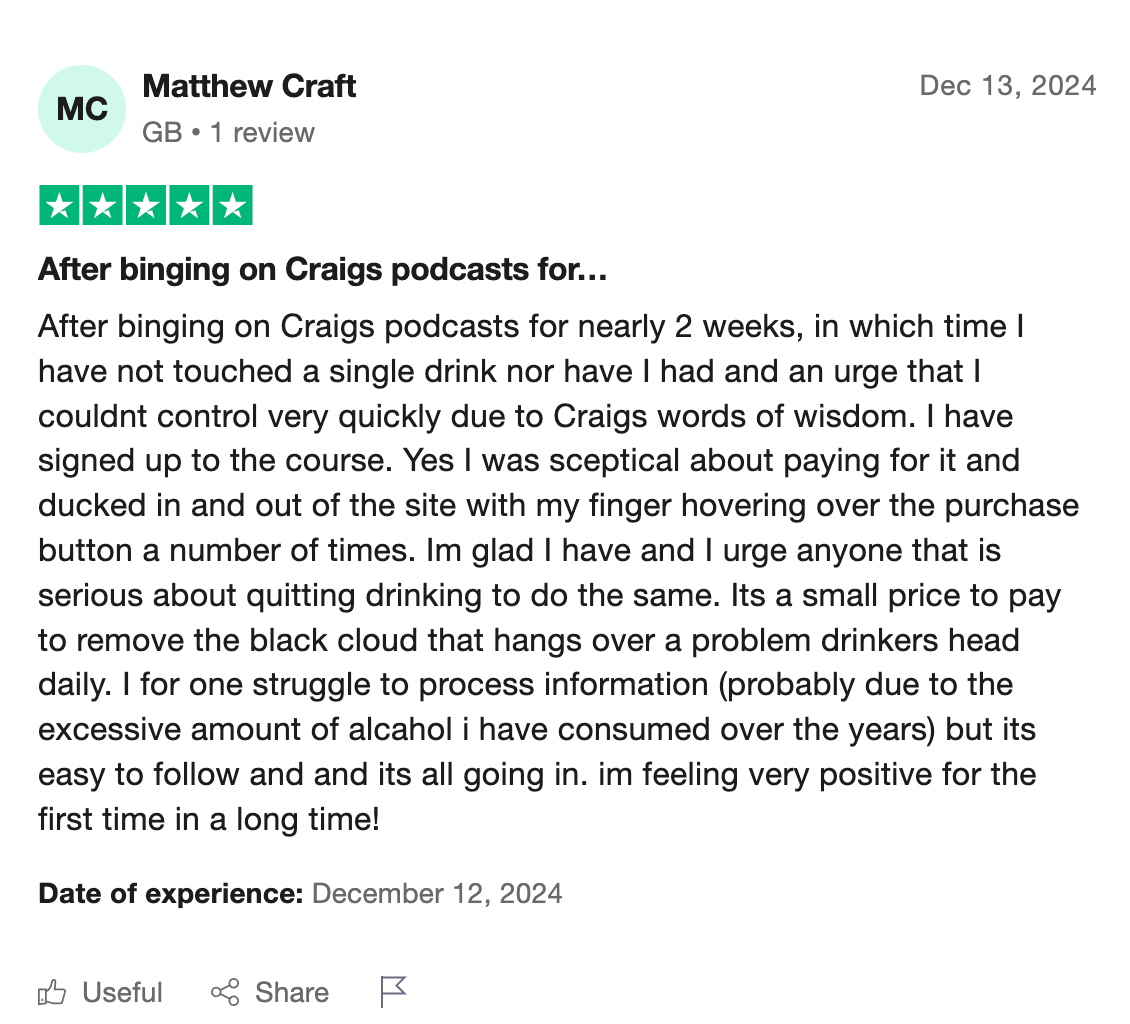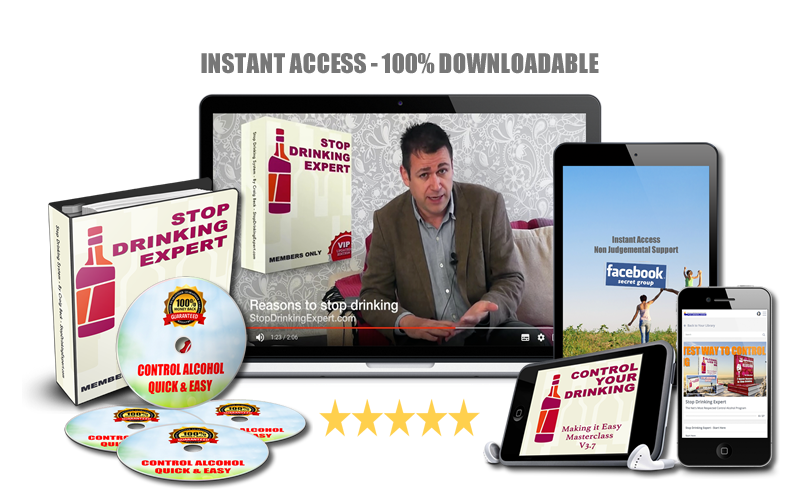Signs Of Alcohol Addiction: How You Know When You Have A Drinking Problem
Signs Of Alcohol Addiction: How You Know When You Have A Drinking Problem
You pour a glass to loosen up while cooking supper. One turns into two, two melts into three, and before you know it you wobble to bed promising yourself that tomorrow will be different. Tomorrow arrives, the cycle repeats, and the uneasy thought creeps in:
Maybe I have a drinking problem. If that voice has started whispering you have already taken the first brave step. Awareness. What follows is a deep dive into the clues your body, mind, bank account, and relationships send when alcohol has climbed into the driver’s seat. Read on, recognise the signs, and discover an exit route that really works.
The Quiet Slide From Social Sipper To Daily Drinker
Most people do not wake one morning and decide to become dependent on alcohol. Dependence grows like ivy, inch by inch. The first tendril is social. Drinks after work feel harmless. You knock back one while the team swaps jokes. Time passes and the after work pint spreads to a nightcap at home. Tolerance develops. That same pint no longer delivers the warm buzz so you pour another. Neurochemistry keeps score. Dopamine spikes fade faster and GABA pathways demand a larger dose to feel settled. What began as a treat morphs into a perceived need.
Researchers at the National Institute on Alcohol Abuse and Alcoholism call this process neuroadaptation. The brain adjusts to frequent exposure and rewrites the set point for normal. Willpower tries to fight yet the subconscious has filed alcohol under survival. Strength of character is not the issue. You would not scold yourself for failing to hold your breath under water and you should not berate yourself for losing a willpower battle that biology already stacked against you.
If you want to explore how apparently innocent habits escalate visit this article on drinking alone. It reveals why isolation and secrecy supercharge the slide from casual to compulsive.
Physical Signals Your Body Sends When It Has Had Enough
The body broadcasts warnings long before a doctor spots cirrhosis. You might wake at three in the morning drenched in sweat, heart thumping. That is your sympathetic nervous system rebounding after alcohol’s sedative effect fades. Maybe your face flushes bright crimson halfway through a second glass. That blush is acetaldehyde, a toxic by-product of metabolism, irritating blood vessels. Persistent heartburn, bloating, or right upper quadrant discomfort can indicate fatty liver or gastritis. Lean adults often miss these signs because they expect only heavy set drinkers to suffer organ distress. The truth is more democratic. Alcohol irritates everyone’s stomach lining eventually.
Look also at the subtle tremor in your hands. If the cup rattles each morning until the first drink lands you are witnessing withdrawal in miniature. The British Heart Foundation warns that continued exposure weakens the heart muscle and invites arrhythmia. Curious about pain under the ribs? Take a moment after reading to scan our guide on right side abdominal pain. You will see how even so-called moderate intake can overload the liver.
None of these red flags say you are broken beyond repair. The human body shows astonishing resilience once alcohol exits the stage. Blood pressure drops within weeks and fatty liver begins to reverse within months. Your job is to notice the whispers before they escalate into shouts.
Mental And Emotional Flags That Should Not Be Ignored
Physical damage grabs headlines yet alcohol wreaks equal havoc on mood and memory. You may wake under a wet blanket of dread unable to recall how last night’s conversation with your partner ended. Those memory holes, small at first, widen over time. Neuroscientists explain that alcohol blocks the transfer of data from short term holding to long term storage. It is like pulling the plug on the backup drive. Passwords, birthdays, cherished jokes — poof.
Emotionally the roller coaster feels endless. You laugh loud at midday then snap at a harmless comment by dusk. That instability stems from cortisol rebound. Alcohol initially lowers stress hormones, then the body overcompensates once levels fall. It is borrowing calm from tomorrow at savage interest.
A study in the Journal of Clinical Psychiatry found that nearly one third of individuals with alcohol use disorder also experience major depressive episodes. Which comes first varies though booze reliably pours petrol on low mood.
If sadness or anxiety dog your heels read our post on alcohol and depression. It unpacks the biochemical tug-of-war and offers practical ways to lift the gloom without topping up a glass.
Social And Relationship Consequences You Cannot Brush Aside
Addiction rarely confines its chaos to private moments. Friends may stop extending brunch invitations after too many messy mimosa mornings. Workmates shuffle papers when you enter a meeting because your jokes have grown edgy and repetitive. Romantic partners endure broken promises and dwindling intimacy. Alcohol meddles with testosterone and oestrogen which shrinks libido. We explore that delicate angle in our piece on alcohol and intimacy.
The wallet tells a sobering truth too. Four pounds spent daily looks trivial until you multiply. One thousand four hundred sixty pounds gone in a year. Americans paying seven dollars a night lose over two thousand four hundred dollars. That money could clear credit cards or fund a beach break with the kids. Instead it ends up in recycling bins as empty bottles of wishful thinking.
Sober eyes also notice reputation costs. Perhaps you miss early meetings or phone family less because evenings blur into hangovers. Trust erodes quietly then all at once. Recognising these ripples matters because guilt and shame thrive in silence. Naming the harm is the first move toward healing it.
Self Tests You Can Do Today Before You Panic
You do not need a clinic appointment to gauge risk. The CAGE questionnaire asks four blunt questions. Should you cut down. Are you annoyed by criticism. Do you feel guilty. Do you take an eye opener in the morning. Two yes answers suggest trouble. The longer AUDIT adds detail on frequency and fallout. Spend ten minutes with either tool and you will walk away wiser.
Pair numbers with a diary experiment. For one honest week jot down every drink, size, and time. Most undercount by thirty percent. Seeing totals in plain black typewriter letters removes wiggle room. Next attempt two consecutive alcohol free days. Notice cravings, sweats, vivid dreams, or irritability. Those reactions signal physical adaptation rather than casual habit.
If data confirms suspicion do not despair. Many readers discover that reality check on a Sunday, feel terrified on Monday, then step into freedom by Friday. Information lights the path action moves the feet.
What To Do If The Bell Is Ringing Loudly
Admitting there is a problem can feel like stepping onto an icy lake. Fear of shame keeps many people frozen. Yet the ice only looks thin. Strong support sits beneath your boots. Start small. Tell a trusted friend or write a letter to yourself. Clear the home of open bottles. Stock sparkling water, herbal tea, and dark chocolate. Change the route you drive to avoid the usual pit stop at the shop.
Next, decide whether to aim for moderation or total freedom. Evidence shows that daily or near daily drinkers find life simpler once alcohol exits completely. No mental bargaining, just clarity. Still unsure? Please join my free live quit drinking webinar.
During the session I will reveal why sheer will seldom succeeds, how to switch off cravings without medication, and why sobriety feels easier than you imagine. Claim your seat at www.StopDrinkingExpert.com. Seats fill quickly because the class is live and interactive.
Need extra motivation? Explore the article on the best time to quit. Spoiler: that time is soon. Then read about the benefits of quitting drinking for an inspiring look at clearer skin, deeper sleep, and fatter wallets.
Conclusion: Turn Concern Into Choice
Alcohol addiction rarely crashes in like a hurricane. It creeps like vines up a brick wall. First the mortar cracks then daylight disappears. Yet bricks can be cleaned, vines pruned, walls restored. If the signs described here ring true for you do not wait.
Book the webinar, meet people walking the same road, and learn the method that has already helped hundreds of thousands regain energy, dignity, and joy. You are not faulty, and you are definitely not alone. You are simply ready for a better chapter. Let us write it together.
References
- National Institute on Alcohol Abuse and Alcoholism. Alcohol Facts and Statistics. Bethesda MD. 2024.
- British Heart Foundation. Alcohol and Heart Health. London. 2023.
- Grant BF et al. Comorbidity between Alcohol Use Disorder and Major Depression. Journal of Clinical Psychiatry. 2022.
- World Health Organization. Global Status Report on Alcohol and Health. Geneva. 2023.
Does this sound familiar?
- Drinking to escape stress and to cope with the pressures of life?
- Waking up full of guilt and regret that you drank again last night despite promising that you wouldn't?
- Hiding alcohol or the evidence of your drinking?
- Feeling like you are living a double life because of your drinking?
- Creating silly rules to try and control your drinking (e.g., I will only drink on special occasions)?
The good news is that you are not alone; the better news is that I can help.
Meet Craig Beck, The World's Most Respected Sobriety Coach
Craig Beck, better known as “The Stop Drinking Expert”, turned a 20-year battle with alcohol into a roadmap for lasting freedom. The bestselling author of Alcohol Lied to Me and The Sobriety Secret discovered that traditional routes like Alcoholics Anonymous can feel embarrassing, public, and all too often, entirely ineffective.
His method is different. It shows you:
- Why you drink in the first place—the hidden brain loops alcohol hijacks.
- How to switch off cravings before they even start.
- A willpower-free exit plan you can follow privately, at your own pace—no labels, no awkward meetings, no medication.
Hundreds of thousands worldwide now wake up clear-headed, proud and at peace thanks to Craig’s approach. Will you be the next?
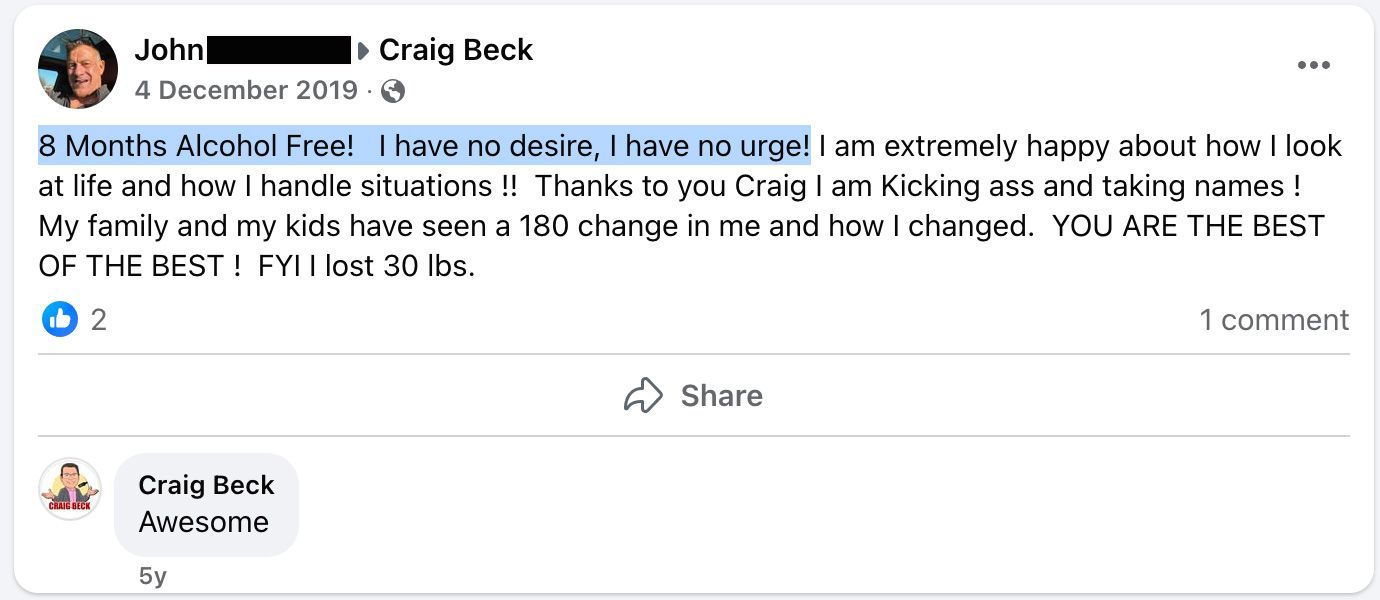
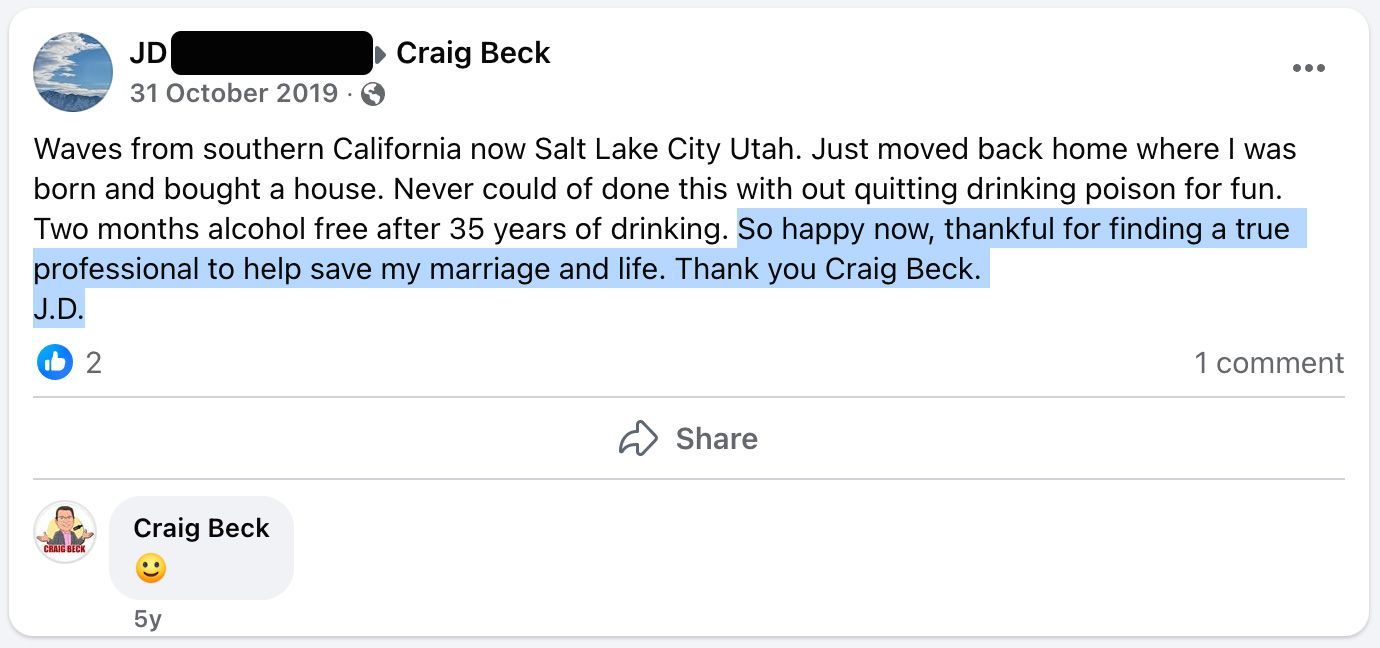
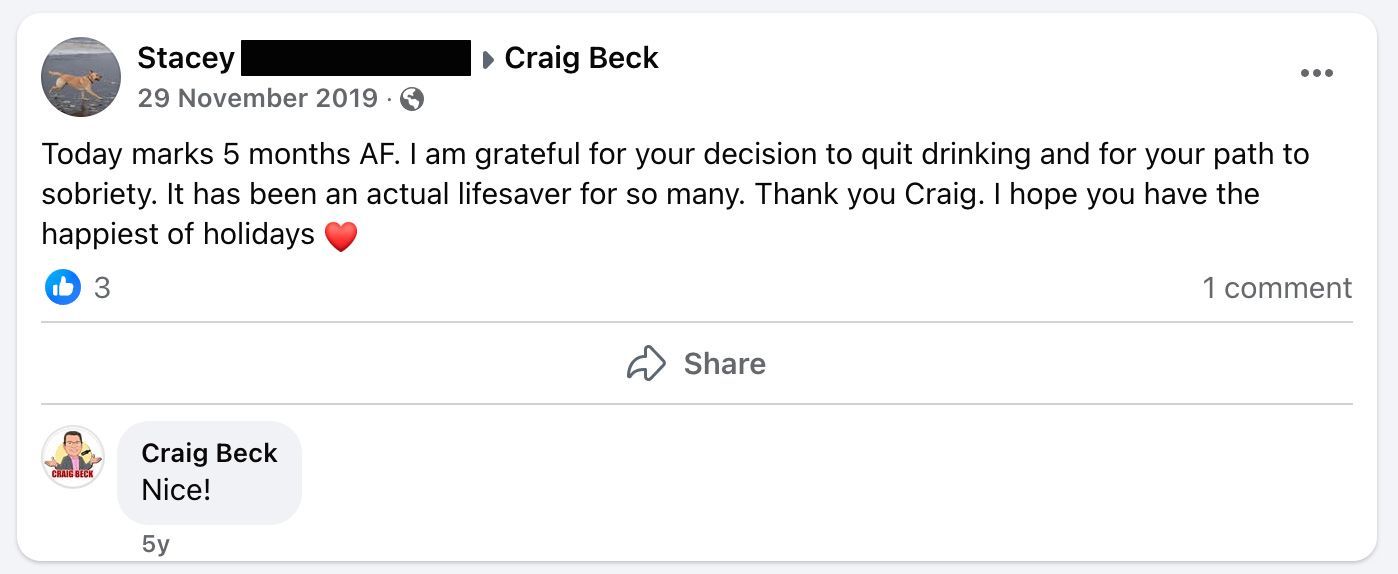
"Effortless Sobriety: The Proven Path to End Problem Drinking"
No one likes asking for help with their drinking—it feels personal and heavy. But if willpower alone hasn’t worked, it’s not because you’re weak. Research indicates that relying solely on grit is unsuccessful approximately 95 percent of the time. You’ve simply been using the wrong tool for the job.
Download my free ebook or decide now get started with the full course and learn:
- Why the game is rigged: how alcohol rewires your brain chemistry and makes “just trying harder” almost impossible.
- A science-based exit plan: practical steps that work quickly, privately, and on your terms.
- No awkward meetings or risky meds: forget the gimmicks—this is about smart strategy, not shame.
`Are you ready to step onto solid ground? Get off the fence, take action, and start taking back control—quickly, confidently, and without the struggle.
Over 250,000 Happy Sober Clients Can't Be Wrong:






